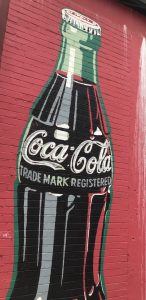Ethnography of Coca-Cola
In 1886, a man named John Stith Pemberton, a pharmacist who enjoyed making concoctions for medicinal purposed, created the beverage that started the Coca-Cola company, known as the French Wine of Coca (Elmore, 2015 ).
The Coca-Cola Company, based in Atlanta, started in 1892 and ever since then has expanded it horizons to countries all over the world. With these expansions, Coca-Cola has had influence in political matters to benefit the company’s production and sales both in the United States and abroad. In addition, over the course of 133 years, Coca-Cola has consumed various natural resources to gain its economic power, but at a price. The utilization of corn syrup and extensive amounts of water, for instance, have put a toll on the environment, but the side effects are generally felt outside of the company’s location base.
Coca-Cola can be found at any major social event, family gatherings, in the background of TV shows and movies, and in your everyday life. Coca-Cola now distributes various brands of beverages, for example Sprite, Vitamin Water, Powerade, Dasani, Hi-C, and Pibb Extra. Despite all these options, their cola soda, known as Coke, is their most well-known. This could be attributed to the many advertisements and memorbilia from the Coca-Cola company.
In general, Coca-Cola has had a significant impact on our way of life today. We may not realize or put much emphasis on the influence this beverage company has had, but they have reached into our political, environmental, and social sectors of life. This websites gives an ethnography of Coca-Cola as a product.
